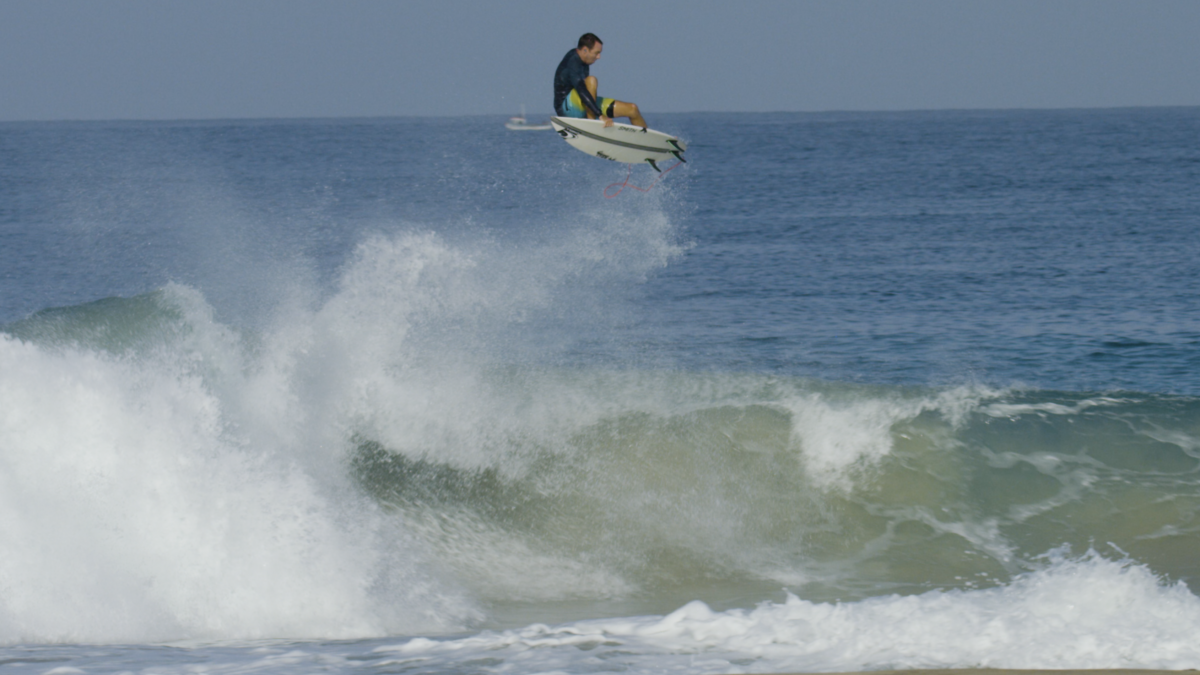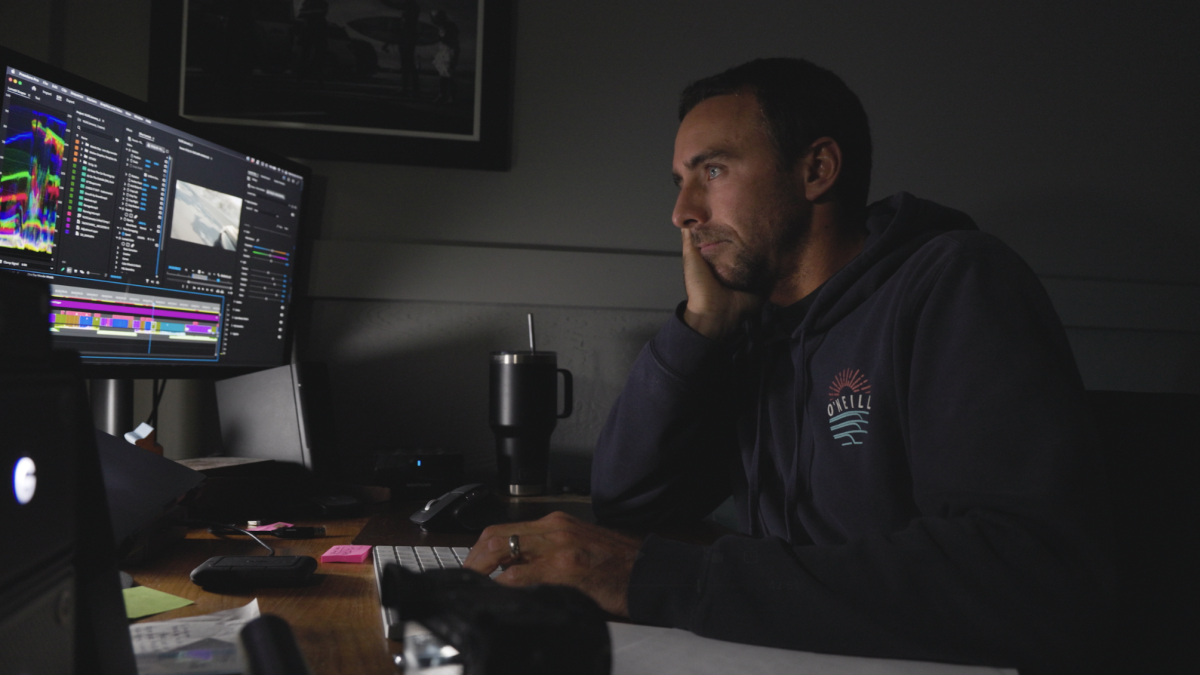Don’t judge a book by its cover, or a surfer by their YouTube page.
From the outside looking in, North Carolina’s Brett Barley is living the dream. A man of faith, married with two kids, getting shacked and making YouTube videos for a living.
But appearances aren’t everything. Behind-the-scenes, Barley’s spent the last few years on the YouTube hamster wheel, locked in his bedroom (sometimes literally) for days, trapped in an online algorithm that rewards likes, comments, and subscribers with views and money — a place where enough is never enough, and you’re only as good as your last edit. In early 2023, that nonstop content cycle took a toll on Barley. He decided he needed a change, and Ambivalent — a 42 minute surf film/story — was born.
In the film, Barley bounces between big barrels and even bigger emotions, so we figured we’d give him a call to ask him more about both.
For a while you were on the YouTube treadmill, releasing content weekly. What inspired you to make a full-length film like Ambivalent? Was it the story, or did you want to save and curate more of your impactful clips?
During all of 2021 and 2022 I was in that cycle — filming swells, editing all day and night, and trying to make my Thursday deadline so I could release an edit that night. I was just grinding away Monday into Thursday morning, doing like 12 to 15 hour days. Then I would focus Friday through the weekend on social media content for the following week.
It was kind of gnarly the way I was going about it because I do it all myself. I also pigeonholed myself in that I kept trying to make each video better, because I’m not the guy that can grab whatever song off the internet and throw it on there. But after doing it for so long I realized I was missing out on a lot of important things — especially time with my family. I wasn’t showing up for my kids or being the husband I should be. It was kind of a spiral.
In early 2023 I started writing things out, trying to put all those thoughts and feelings on paper. Then I went to Namibia and didn’t try to document every second of the trip like I had on my previous trips, which was really refreshing. That fall pumped at home [on the OBX], and I knew I had some good clips to start making a movie. So I basically spent all of last year — on and off — writing, filming and editing for it.

YouTube
It’s not easy to publicly say “I felt like a liar making videos full of joy, while editing them in sorrow.” Talk a bit about your decision to share what you’ve been feeling in recent years.
I’ve never been afraid to be brutally honest with myself. I would run into people and they’d be like, “Oh man, your life is perfect, you’re living it up.” And I mean it is, but I was still at my computer by myself all day and night, stressing about music and clips and views and likes.
I felt like maybe people were misinterpreting my life because of the videos I was making. And I didn’t want people to look at my videos and think their life isn’t as good. I think that’s what made it so hard for me because I would make videos and post them and see all the positive comments and people looking at my at my life from the outside in, but then knowing that I was was editing in my bedroom packing in 40 some hours in three days to get a video out [laughs]. You know, it’s not all glamorous.
Has making Ambivalent been therapeutic in a way?
For sure. My goal in working on Ambivalent was to re-envision what my YouTube channel is going to look like. I would like it to be more sustainable, because I made it unsustainable for myself trying to edit a new 20 minute movie every week [laughs].
I was making each edit like a movie — there was music during the voiceovers and all of the background stuff and then I’m filming it all too. Going forward, I’ll put out more videos that aren’t necessarily as polished, maybe even raw content, and then save those special edits for special swells, and then periodically give myself the freedom to just use whatever music I want, because on YouTube you can use almost anything, but you can’t make money off edits if you use certain songs. I’ve always struggled with that, considering I’m someone that’s trying to make money off YouTube [laughs].

YouTube
To avoid falling back into the content trap, can you talk a little about what you’re doing differently moving forward?
I think I just had to I had to step away from what I was doing, because it worked for a bit, but I was just grinding at a rate that was unsustainable. It was kind of like the grind mentality was being glorified in my mind. Like it was cool to be editing at 2am. Not on purpose, but I got into that. And it got to a point of like, is that healthy for me? No. Is it healthy for my family? Definitely not.
Even crazier was I was missing waves to make an edit. I’d have 4 or 5 videos to edit and there would be waves and I was not even stoked to surf. It’s so ironic: my job’s to surf, but I missed surf to edit surf [laughs].
So yeah, the film for me was a lot of self-reflection and understanding of what I was going through, and all the doubts I was having in myself, because a lot of it transpired post-Covid when companies were cutting budgets and I was losing sponsors and…it’s one thing to work really hard to make good money. It’s another thing to grind really hard and scrape by and realize, like I actually have the ability to get other jobs that would pay me better and then I could just surf [laughs]. But at the same time I feel like I’m still meant to be in the surf world for now, but I just needed to re-envision what that looked like.
I’m actually super excited, especially now that the film’s out. It felt weird to wake up today and be like, “alright, that’s it. I don’t have to think about that anymore.” Two years since inception, and a year and a half since I started editing it. It was a cool feeling — I’ve never done a project that big, and I did it all on my own. Of course I had help from Layne [Stratton] and all the filmers that got me footage, but I did all of the editing and all of the music sourcing.
The coolest thing was doing the premieres in person back in December. The amount of people afterwards that I was having conversations with that were just like, “Oh man, I’ve been going through the same thing, I’ve had all this going on and it just kind of feels like I’m the only one.” That was rad. It’s like, we’re all human, we all deal with stuff, we just don’t all share about it, or even check in on each other about it, which we should. So it’s been really cool having those conversations and my hope is that whether it’s the surfing or the story, people will enjoy it in some aspect.

